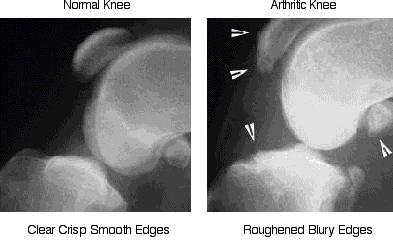Arthritis in Senior Pets
Cats and Dogs are considered seniors at the age of seven and are at risk for arthritis.
Signs:
- Gradual decrease in activity especially running and jumping
- Trouble or stiffness in getting up in the morning or after resting
- Mild limp that improves with exercise
- Increased trouble with movement in cold weather
- Weight gain
Pictures of Arthritis

Diagnosis:
Exams allow us to determine areas of pain in the joints or in the spine that may be the source of trouble.
Radiographs may help confirm the diagnosis of arthritis
Other conditions that can mimic arthritis include bone spurs, loose cartilage in the joint, joint infections, and cancer.
Treatment:
- Weight Loss:
- Obesity hastens the development of arthritis, and is a major complicating factor in the severity of pain the pet feels and the ability of medications to control the pain. 75% of the pet population is overweight. In cats 15 minutes of play (i.e. batting at a toy) every day, will help decrease weight.
- Regular Low Impact Exercise:
- Frequent walking can help keep muscle tone and loosens the joints for easier movement, as well as helps with weight loss. Running and jumping should be avoided.
- Glucosamines:
- This is a natural, over the counter supplement. This supplement aids in joint repair and slows the progression of arthritis. It should be used daily for best affect. The most common side affect occurs in 1% of the pet population and is mild stomach upset.
- Fatty acids:
- This is an over the counter supplement that decreases inflammation in the joints and helps maintain joint health. It also improves skin health and brain function.
- Injectable Glycosaminoglycans:
- These injections have been proven to aid in joint repair and decrease the severity of arthritis in dogs. They are given twice a week for four weeks then once about every six months as needed.
Pain Relievers:
Due to side affects pain relievers should only be used when absolutely necessary.
Pain relievers only cover up the signs of arthritis, they do not help improve or treat the condition.
Prior to long-term use of painkillers it is important to confirm the diagnosis of arthritis with radiographs. Blood work is necessary to check for healthy liver function ensuring the pet can metabolize the painkillers.
Aspirin has numerous side affects including GI ulcers, anemia and clotting disorder. It is not recommended for long-term use in dogs. Cats are highly sensitive to aspirin and can suffer liver damage is the dosage is not carefully controlled by a veterinarian.
Ibuprofen, Motrin, Advil, Aleve, Tylenol, and other painkillers are very dangerous for pets, often causing acute liver failure, and should be avoided completely.
Rimadyl and Etogesic are safer then Aspirin for pain control, but can affect the liver with long term use. Annual exams and blood work are recommended for patients using constant pain relief. Metacam is available for cats with severe arthritis pain.
